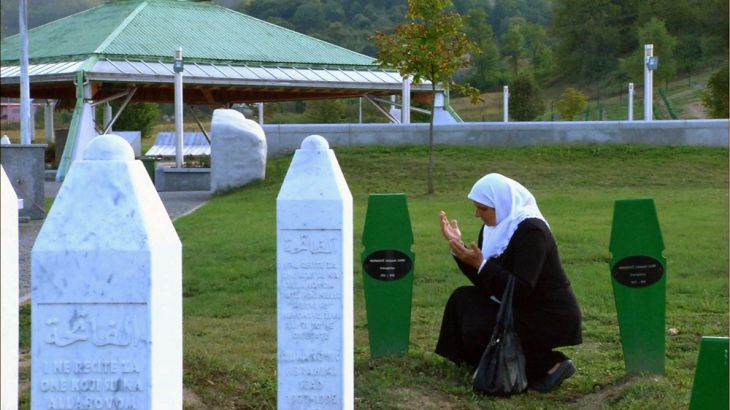
Srebrenica: Women Who Refuse to Die
More than two decades after the Srebrenica massacre, four Bosnian women look to the future despite the pain of the past.
Filmmaker: Mohamed Kenawi
In July 1995, Bosnian Serb forces killed an estimated 8,000 Muslim men and boys – all of them sons, husbands and brothers – in the small town of Srebrenica.
Keep reading
list of 4 itemsPalestinian Prisoner’s Day: How many are still in Israeli detention?
‘Mama we’re dying’: Only able to hear her kids in Gaza in their final days
Europe pledges to boost aid to Sudan on unwelcome war anniversary
The Srebrenica massacre was a particularly inhumane and brutal act during the bloodshed and tragedy of the Bosnian War from 1992 to 1995.
This film follows four women who lost fathers, brothers and sons in the massacre, as they look to the future despite the pain of their loss and the angst of trying to make sense of the past.
“When they took away my children in 1995, they also killed me. This is no life. I walk about like a zombie. I’m alive, but not really,” says Hatidza Mehmedovic of the Mothers of Srebrenica Association.
“I had my family and after just one day I was left without them. Every morning I ask myself why. For what reason? But there is no answer. My children’s only guilt was the names they had. … They killed all I had, except for my pride.”
Women Who Refuse to Die is about women who survived the horror, only to find themselves facing the anguish of having lost loved ones – and trying to find ways to continue, one day at a time.
This film was updated in 2015 and again in July 2020 to include the following: In June 2010 five Bosnian Serb officials were found guilty of war crimes in the UN Yugoslav tribunal for the massacre that took place in Srebrenica in July 1995. The men appealed, but in January 2015 their convictions were upheld.
This update also references the International Criminal Court Tribunal for the Former Yugoslavia (ICTY) in The Hague which investigated cases of genocide and war crimes committed during the wars in former Yugoslavia. In 2016 and 2017, the tribunal delivered two key verdicts against Bosnian Serb leaders Ratko Mladic who was sentenced to life imprisonment for his crimes and Radovan Karadzic who received a sentence of 40 years.
